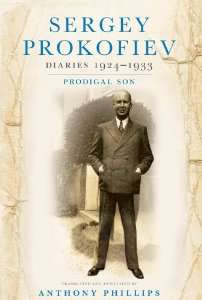|
Back
03/06/2013
Sergei Prokofiev: Diaries 1924-1933/Prodigal Son
Translated from Russian by Anthony Phillips
Cornell University Press, $60, hardcover, 1,152 pgs., photos

Composer Sergey Prokofiev was leading a prolific, successful career in the West, an influential member of the legendary Les Six, ensconced in Paris in the 20s. Yet the composer and his wife Lina, Spanish and a semi-professional singer, were not satisfied creatively, intellectually or spiritually. In the 30s, he packed up and moved them back to his homeland and to what ultimately would be a punitive existence in Stalinist Russia.
When he died in 1953, the composer’s music officially sullied and only to be rediscovered in the West and eventually Russia decades later. He may have sabotaged his success but his return to his homeland was part of his greatest populous and enduring work Peter and the Wolf, his ballets Romeo and Juliet, Cinderella, and the film scores to Ivan, the Terrible and Alexander Nevsky.
Prokofiev was also a candid, gossipy and otherwise compulsive diarist, which he kept for 26 years, the final installment Prodigal Son/Diaries 1924-1933. It covers the years leading up to his return. This is a remarkable 1,110 pg. volume translated from Prokofiev’s handwritten notebooks, acquired from official Russian archives, transcribed by his son and grandson and translated into English by musical scholar and biographer Anthony Phillips. The diaries are a fascinating dimensional portrait of a brilliant composer in his prime.
In Paris, Prokofiev was already world famous for such famous orchestral works as Love for Three Oranges, and was in demand as a concert pianist. He was in and out of favor with Sergei Diaghilev, but was nonetheless commissioned for several ballet scores. He was aware of the growing oppression of Russians under Stalin. Yet, Prokofiev wanted to return to Russian soil for many reasons, personal and artistic. This intimate peek at his private life and thoughts is about the international music scene at the time.
Prokofiev is deferential to Diaghilev’s power, and is amused, but nonjudgmental, about the impresario’s bevy of male lovers. Prokofiev was adroit pragmatist in every sense. Take this exchange he records with Diaghilev while creating the score for choreographer George Balanchine ballet Prodigal Son: “Diaghilev’s parting words to me had been: Your piano pieces are a shade arid. I want the ballet you are writing for me to be more straightforward.” “And that is what I was doing.”
He brokers the publishing rights to his works, settles his domestic arrangements not only for his wife and son, but his ailing mother. He navigates the fast-paced arts world of Paris, London and New York with seeming casualness. When he starts returning to Russia to tour and scope out the artistic and political landscape, he does so with eyes open. He is aware that people may be listening through doors, so whispers conversations to Lina and he knows that his correspondence from Russia will be intercepted, and he is savvy enough to casually be critical of the West at dinner parties.
The diaries also reveal that Prokofiev became a Christian Scientist in the years before he went back and there was a quiet spiritual component. He becomes a believer, even as he questions the metaphysical tenets. The pulse of his family life- recording arguments with Lina, his son hurting himself or his frequent bouts of migraine headaches are of equal importance, the mark of a seasoned diarist.
He weighs in off-handedly but with valuable insights into the music of contemporaries and predecessors. He dissects, for example, Tchaikovsky’s Sixth symphony, marveling at the brilliance of the first movement and proceeding to explain why it falls apart from there.
He started considering going back to Russia even though he knew that things were far from ideal. He hung on to a subculture of intellectuals and devotees to Russian nationalistic traditions separate from political idealism or Stalinist doctrine. As immersed in the elite art world and as prolific as Prokofiev was during this period, he was facing financial difficulties.
Some of the most engaging entries are Prokofiev’s no holds barred observations about other composers. Take this entry from 1925: “ It is Scriabin, not Stravinsky, who is the national composer, because Scriabin with his passion for theosophy interwoven with eroticism, his soaring eruptions, his refinements […] reflect the Russian epoch in its entirety. But Stravinsky […] is not a true Russian, but the facsimile of a Russian the French wanted to construct for themselves.”
The biggest revelation in this volume is that Prokofiev wrote in utter secrecy about his 1927 return trip to Russia. The composer separated them from the rest of his papers that ended up in Kremlin control. His descendants were not even aware of them until the 90s, when they were discovered in England. In the entries, Prokofiev gives a vivid account of a politically torn country and his potential place in it. He is actually fact finding, tapping into the Euro-Asian cultural underground, while he is being warily courted as the Soviet artistic Prodigal Son.
The insider view cross-referencing in the diaries alone make this an invaluable resource. Its uniqueness in the pantheon of literature on the lives of the composers cannot be understated. But the availability of Prokofiev as not only a musical genius, but a devoted husband and father, lusty artist and creative intellectual makes this required reading for anyone interested in 20th century music.
Lewis Whittington
|